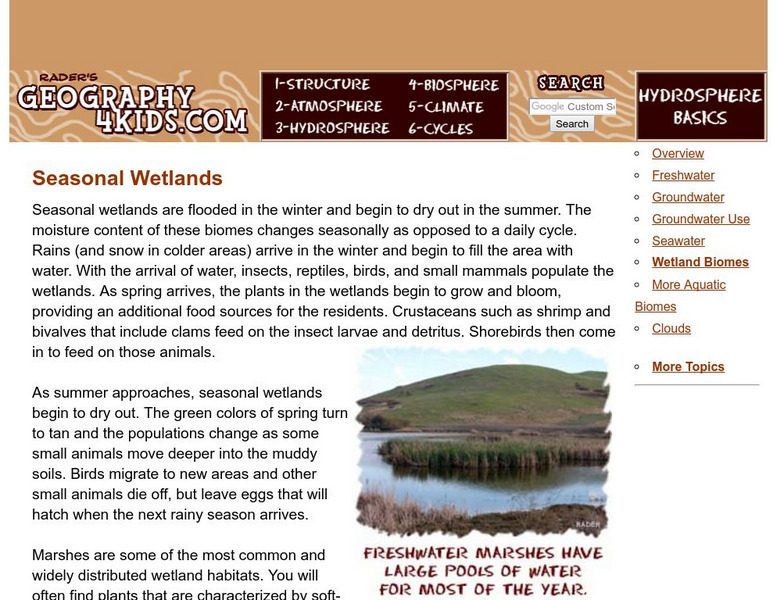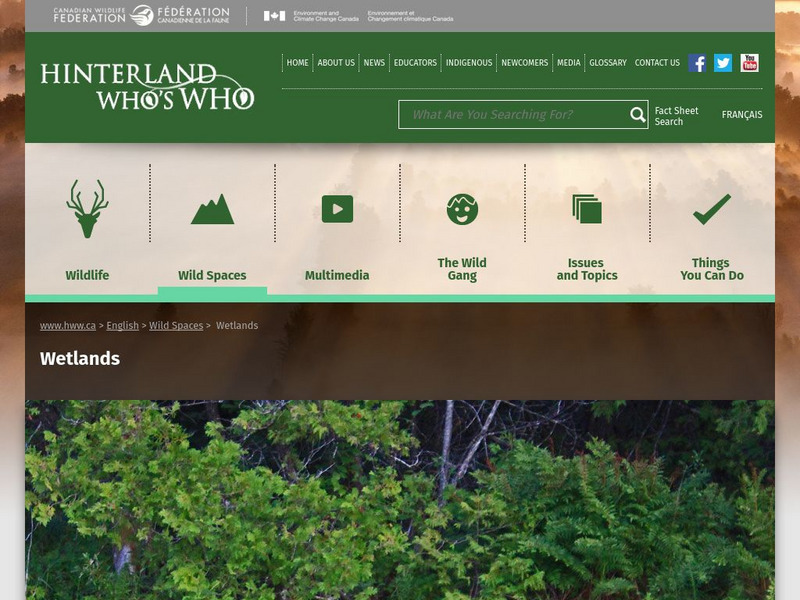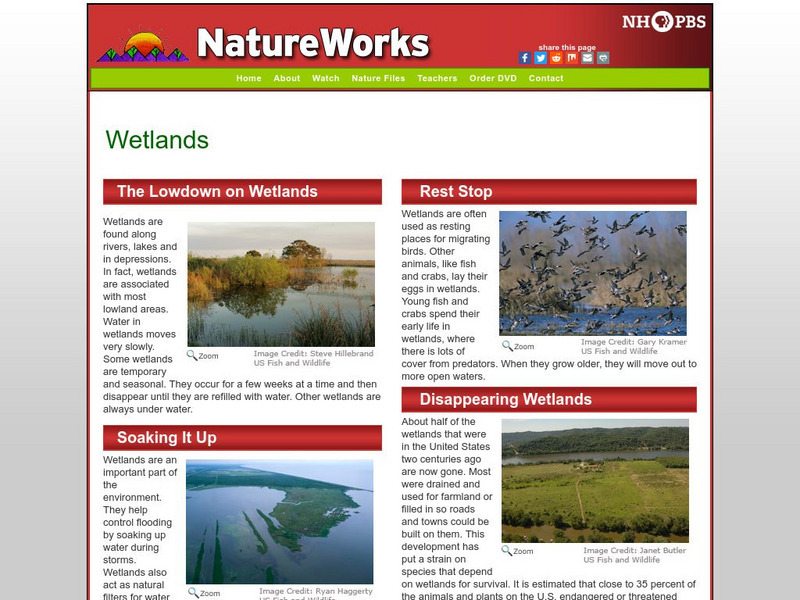NOAA
Noaa: Estuaries 101 Curriculum: Migrating Mangroves and Marshes
Become a mangrove expert. Use this module to learn how to identify species of mangroves found in Florida, and find out why these plants are important in the estuary.
Encyclopedia of Earth
Encyclopedia of Earth: Evolutionary Biology: Adaptations of Marsh Plants
Article describing the types of stressors faced by plants living in wetlands areas and adaptations they have made in order to survive. (Published: January 12, 2009)
Smithsonian Institution
National Museum of Natural History: American Mammals: Marsh Rabbit
Marsh Rabbits live only in marshy areas, and like Swamp Rabbits, are good swimmers. They are often found in habitats with pools of brackish water and plants such as cattails, water hyacinth, rush, centella, and marsh pennywort. Learn...
A-Z Animals
A Z Animals: Reference: Habitats: Swamps and Wetlands
Learn about the plants, animals, and other characteristics of some wetland ecosystems.
Curated OER
Etc: Maps Etc: Swamp Lands of the United States, 1911
A map from the 19th Annual Report of the U.S. Geological Survey (1898) showing areas of swamp and marsh lands in the United States at the time, with degrees of swampiness shown in two shadings.
Other
Marsh Mission: Saving Louisiana's Wetlands
Take an artistic-educational journey into the Louisiana wetlands to find out about the crisis affecting not only Louisiana but all of the United States. See what treasures the wetlands hold and what disasters await if we continue this...
NOAA
Noaa: Estuaries 101 Middle School Curriculum Overview [Pdf]
The Estuaries 101 Middle School Curriculum is a multimedia curriculum focused on the theme "Estuaries & You." It includes a series of online activities for middle school students that highlight our nation's living laboratories, all...
Geography 4 kids
Geography4 kids.com: Seasonal Wetlands
Identify the four types of seasonal wetlands found across the earth. There are fresh water and salt water marshes, bogs, and swamps.
Missouri Botanical Garden
Missouri Botanical Garden: Fresh Water Wetlands
What are fresh water wetlands? What creatures live in a wetland? Are wetlands in danger? Find out at this informative site. Use the toolbar at the left to navigate through the site.
National Center for Ecological Analysis and Synthesis, University of California Santa Barbara
Nceas: Kids Do Ecology: Freshwater Wetlands
Find out about the plants, animals, people, and location of freshwater wetland ecosystems.
National Geographic
National Geographic: Geostories: American Wetlands
Visit this GeoStory to discover the wetland ecosystems across the United States.
PBS
Nh Pbs: Nature Works: Ponds
Can you give a definition for a pond? This site provides information ranging from types of plants living in ponds to how ponds were formed. Don't miss out on the photographs found within the site too.
Encyclopedia of Earth
Encyclopedia of Earth: Botany: Mangrove Ecology
Extensive article on mangroves. Covers classification, physical characteristics, life cycle, habitat, economic value, and natural and human threats to their survival.
Canadian Wildlife Federation
Hinterland Who's Who: Wetlands
Learn about Canada?s wetlands, what they are and where they are located. Wetlands are divided into two classes: freshwater and saltwater. They are further separated into four main types: ponds, marshes, swamps, and peatbogs. Discover the...
University of Florida
Florida Museum of Natural History: About the Florida Everglades
Everything you always wanted to know about the Everglades! The Florida Museum of Natural History offers great photos and good information on the many habitat types to be found there.
The Wild Classroom
The Wild Classroom: Biomes of the World: Wetlands Biome
Learn about wetlands ecosystems. Find out about plants, animals, adaptations, and conservation efforts.
Council for Economic Education
Econ Ed Link: There Is Something in the Water
The United States is losing 60,000 acres of wetlands each year. Is this good or bad? Does anyone really want to live in swamps, fens, bogs, and marshes? Or is it better economics to drain the wetlands for other purposes like agricultural...
PBS
Nh Pbs: Nature Works: Wetlands
Did you know that wetlands are frequently used as resting stops for migrating birds? This is just one of the many interesting facts found within this educational resource. This site features information on the characteristics, types,...















